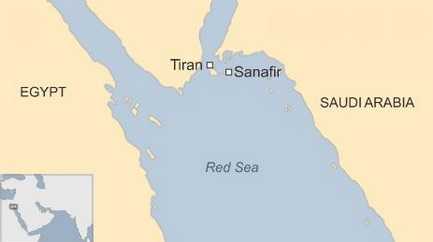
30 June 2022; MEMO: Officials from the United States, Israel, Saudi Arabia and Egypt are currently negotiating on a deal regarding the ownership of islands in the Red Sea, in a move which could further ties between Riyadh and Tel Aviv.
According to Axios, which cited three anonymous senior Israeli officials, diplomats and lawyers from the four countries are working on a series of agreements, letters and understandings which would enable the transfer of the two Red Sea islands of Tiran and Sanafir from Egyptian to Saudi control.
In June 2017 and then, March 2018, the Egyptian Parliament and Supreme Court approved a deal to transfer the islands' sovereignty to Saudi Arabia after decades of debate on who has the right to them. Located in the Red Sea near the Gulf of Aqaba, the islands are strategic in that they control shipping through the straits of Tiran, which is the only route providing access to Israel's port of Eilat.
The islands' strategic attributes had led it to be taken by Israeli forces in 1949, before the 1979 Israeli-Egyptian peace treaty ruled that they became a demilitarised zone, with a force of US-led multinational observers present on them.
Due to that treaty, Cairo's hand-over of the islands to Riyadh had to gain approval by Tel Aviv, which was given, but only in principle. Now, the details of the transfer are being ironed out and negotiated to cater to the interests of all sides.
Saudi Coast Guard turns away Egypt boats from Red Sea islands ceded in controversial deal
So far, the Saudis have demanded that the US-led multinational force of observers who patrol the islands must leave, while guaranteeing that it will uphold the existing commitments and maintain the same security arrangements. While that is simple in the case of Saudi-Egyptian relations, the situation grows complicated when it comes to an agreement with Israel.
Due to the Kingdom not having open and official diplomatic ties with Israel, they cannot directly sign official bilateral agreements, meaning they are attempting to come up with a set of creative legal and diplomatic solutions which would seal the deal.
"The trick here was how Saudi Arabia can sign an agreement with Israel without signing an agreement with Israel. There is no disagreement of substance," one of the senior officials told Axios. "The key issue is how to do it in a way that everybody feels comfortable with, politically."
According to these officials, once the agreement is finalised and Saudi Arabia signs it with Egypt, the Kingdom will send a letter to the US – who is the guarantor – stating the commitments made. Washington would then send Tel Aviv a letter with guarantees, primarily focusing on the freedom of navigation aspect.
The participants in the deal are reportedly aiming to have it finalised ahead of US President Joe Biden's visit to the Middle East in July. The agreement is also predicted to have the effect of drawing Saudi Arabia and Israel closer together diplomatically, amid recently revamped efforts by the US to normalise relations between the two.
One of the major developments, as a result of the agreement, was Saudi Arabia's guarantee that it will allow Israeli airlines to fly over its airspace, in return for Tel Aviv's approval of the transfer.




